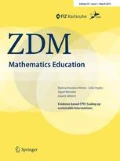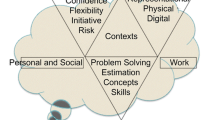Abstract
Teachers’ pedagogical content knowledge (PCK) importantly contributes to instructional quality and student outcomes. We aimed to complement the limited insights into preservice preschool teachers’ PCK, and its association with opportunities to learn (OTL), during teacher training. We offered 162 first-to-final-year preservice preschool teachers from two different teacher training institutes in Flanders (Belgium) a recently developed scenario-based instrument addressing students’ understanding of preschoolers’ (mis)conceptions and appropriate instructional strategies in the domain of early mathematics. Our findings revealed quantitative differences between first-year students’ PCK on the one hand and second-year and third-year students’ PCK on the other hand. We did not observe any quantitative differences in PCK between second-year and third-year students. Additional analyses on students’ errors pointed to qualitative differences between first-, second- and third-year students’ PCK. We interpret these findings in view of students’ OTL during teacher training, and discuss their theoretical and methodological implications for future work in the domain of teacher competence.
Similar content being viewed by others
References
Anders, Y., & Rossbach, H.-G. (2015). Preschool teachers’ sensitivity to mathematics in children’s play: The influence of math-related school experiences, emotional attitudes, and pedagogical beliefs. Journal of Research in Childhood Education,29(3), 305–322. https://doi.org/10.1080/02568543.2015.1040564.
Blömeke, S., Buchholtz, N., Suhl, U., & Kaiser, G. (2014a). Resolving the chicken-or-egg causality dilemma: The longitudinal interplay of teacher knowledge and teacher beliefs. Teaching and Teacher Education,37, 30–39. https://doi.org/10.1016/j.tate.2013.10.007.
Blömeke, S., Hsieh, F.-J., Kaiser, G., & Schmidt, W. H. (2014b). International perspectives on teacher knowledge, beliefs and opportunities to learn: TEDS-M results. Switzerland: Springer.
Blömeke, S., Gustafsson, J.-E., & Shavelson, R. J. (2015). Beyond dichotomies: Competence viewed as a continuum. Zeitschrift für Psychologie,223, 3–13. https://doi.org/10.1027/2151-2604/a000194.
Blömeke, S., Jenßen, L., Grassmann, M., Dunekacke, S., & Wedekind, H. (2017a). Process mediates structure: The relation between preschool teacher education and preschool teachers’ knowledge. Journal of Educational Psychology,109(3), 338–354. https://doi.org/10.1037/edu0000147.
Blömeke, S., König, J., Busse, A., Döhrmann, M., & Hoth, J. (2017b). Professional competencies of (prospective) mathematics teachers—Cognitive versus situated approaches. Educational Studies in Mathematics,94, 161–182. https://doi.org/10.1007/s10649-016-9713-8.
Cochran-Smith, M., & Zeichner, K. M. (2005). Studying teacher education: The report of the AERA panel on research and teacher education. Mahwah: Lawrence Erlbaum.
Darling-Hammond, L., Holtzman, D. J., Gatlin, S. J., & Heilig, J. V. (2005). Does teacher preparation matter? Evidence about teacher certification, Teach for America, and teacher effectiveness. Education Policy Analysis Archives. https://doi.org/10.14507/epaa.v13n42.2005.
Depaepe, F., Verschaffel, L., & Kelchtermans, G. (2013). Pedagogical content knowledge: a systematic review of the way in which the concept has pervaded mathematics educational research. Teaching and Teacher Education,34, 12–25. https://doi.org/10.1016/j.tate.2014.12.009.
Duncan, G. J., Dowsett, C. J., Claessens, A., Magnuson, K., Huston, A. C., Klebanov, P., et al. (2007). School readiness and later achievement. Developmental Psychology,43, 1428–1446. https://doi.org/10.1037/0012-1649.43.6.1428.
Evens, M., Elen, J., & Depaepe, F. (2017). Effects of opportunities to learn in teacher education on the development of teachers’ professional knowledge of French as a foreign language. Journal of Advances in Education Research,2(4), 265–279.
Gasteiger, H., Bruns, J., Benz, C., Brunner, E., & Sprenger, P. (2019). Mathematical pedagogical content knowledge of early childhood teachers. A situation-related cognitive measurement approach. ZDM Mathematics Education
Ginsburg, H. P., & Amit, M. (2008). What is teaching mathematics to young children? A theoretical perspective and case study. Journal of Applied Developmental Psychology,29, 274–285.
Grossman, P. L. (1990). The making of a teacher: Teacher knowledge and teacher education. New York: Teachers College Press.
Hattie, J. (2009). Visible learning: A synthesis of over 800 meta-analyses relating to achievement. London: Routledge.
Kaiser, G., Busse, A., Hoth, J., König, J., & Blömeke, S. (2015). About the complexities of video-based assessments: Theoretical and methodological approaches to overcoming shortcomings of research on teachers’ competence. International Journal of Science and Mathematics Education,13(2), 369–387.
Kleickmann, T., Richter, D., Kunter, M., Elsner, J., Besser, M., Krauss, S., et al. (2013). Teachers’ content knowledge and pedagogical content knowledge: The role of structural differences in teacher education. Journal of Teacher Education,64, 90–106. https://doi.org/10.1177/0022487112460398.
Knievel, I., Lindmeier, A. M., & Heinze, A. (2015). Beyond knowledge: measuring primary teachers’ subject-specific competences in and for teaching mathematics with items based on video vignettes. International Journal of Science and Mathematics Education,13, 309–329. https://doi.org/10.1007/s10763-014-9608-z.
Krauss, S., Bruckmaier, G., Lindl, A., Hilbert, S., Binder, K., Steib, N., & Blum, W. (2019). Competence as a continuum in the COACTIV-Study—“The cascade model”. ZDM Mathematics Education.
Krauss, S., Brunner, M., Kunter, M., Baumert, J., Blum, W., Neubrand, M., et al. (2008). Pedagogical content knowledge and content knowledge of secondary mathematics teachers. Journal of Educational Psychology,100, 716–725. https://doi.org/10.1037/0022-0663.100.3.716.
Lee, J. E. (2010). Exploring kindergarten teachers’ pedagogical content knowledge of mathematics. International Journal of Early Childhood,42, 27–41.
Lee, J. E. (2017). Preschool teachers’ pedagogical content knowledge in mathematics. International Journal of Early Childhood,49(2), 229–243.
McCray, J. S. (2008). Pedagogical content knowledge for preschool mathematics: Teacher knowledge and math-related language contribute to children’s learning. Chicago: Erikson Institute.
McCray, J. S., & Chen, J.-Q. (2012). Pedagogical content knowledge for preschool mathematics: construct validity of a new teacher interview. Journal of Research in Childhood Education,26, 291–307.
Oppermann, E., Anders, Y., & Hachfeld, A. (2016). The influence of preschool teachers’ content knowledge and mathematical ability beliefs on their sensitivity to mathematics in children’s play. Teaching and Teacher Education,58, 174–184.
Qian, H., & Youngs, P. (2016). The effect of teacher education programs on future elementary mathematics teachers’ knowledge: a five-country analysis using TEDS-M data. Journal of Mathematics Teacher Education,19, 371–396. https://doi.org/10.1007/s10857-014-9297-0.
Schmidt, W. H., Cogan, L., & Houang, R. (2011). The role of opportunity to learn in teacher preparation: An international context. Journal of Teacher Education,62, 138–153. https://doi.org/10.1177/0022487110391987.
Shulman, L. S. (1987). Knowledge and teaching: foundations of the new reform. Harvard Educational Review,57(1), 1–22.
Strawhecker, J. (2005). Preparing elementary teachers to teach mathematics: how field experiences impact pedagogical content knowledge. Issues in the Undergraduate Mathematics Preparation of School Teachers,4, 1–12.
Author information
Authors and Affiliations
Corresponding author
Additional information
Publisher's Note
Springer Nature remains neutral with regard to jurisdictional claims in published maps and institutional affiliations.
Appendices
Appendix 1: Scenario-based instrument, Situation 1
Max goes to the table with games. There are already four children at the table. The children want to play a game with dice. You ask Max: “How many children want to play the game?”.
Max points to himself and to each individual child at the table. Each time he points to a child, Max slowly states a number word: “One, two, three, four, five!”. He remains silent and looks at you. You ask again: “And? How many children want to play the game?”. Max restarts the counting process and points to each child individually and says: “One, two, three, four, five!”.
You show him the box with the tokens and ask: “Each player needs a token. How many tokens do we need?”. Max looks at you and shrugs.
You say: “How can we find out?”. Max takes a token and puts it next to one of the children at the table. He takes another token and puts this one next to another child at the table. He continues until every child at the table has a token. You ask: “And? How many token did you give to the children?” Max counts the tokens while pointing to them one by one and says: “One, two, three, four, five!”.
1.1 A: Max shows that he already knows a lot about number and magnitude. Which abilities does he master already?
Indicate the correct answer with a cross
He is able | He is not able | Not observable in the situation | I do not know | |
|---|---|---|---|---|
A2 Max is able to say how many children would like to play | X | |||
A3 Max can make one–one-correspondences | X |
1.2 B: Which of the following activities might help Max best to learn what he is not able to do yet?
Indicate one response.
- O:
Counting aloud till five with the whole group.
- X:
Sorting buttons per color, counting the buttons per color, and telling another child how many buttons per color there are.
- O:
Writing digits in the sand using his finger.
- O:
Counting backwards from five to one.
- O:
I don’t know.
1.3 C: Which of the following activities might additionally help Max best to learn what he is not able to do yet?
Indicate one response.
- X:
Saying how many coins he has in his wallet when playing a shopping game.
- O:
Naming numbers that are presented on cards.
- O:
Asking Max to put cups and spoons on the table, with one spoon for each cup.
- O:
Using a counting rhyme to determine who can start the game.
- O:
I don’t know.
Appendix 2: Scenario-based instrument, Situation 5
The preschoolers just received new toys for the class. Each child wants to play with the new toys. The preschool teacher puts an hourglass on the cupboard to indicate how long each preschooler can play with the new toys. If the hourglass shows that the time is over, the next preschooler can play with the new toys.
Bas waits for the hourglass indicating that time is over, while Mia is playing with the new toys. Bas complains: “It takes so long before it’s my turn.” The hourglass indicates that the time is over and Bas can play with the new toys. The preschool teacher turns around the hourglass and Bas starts playing with the new toys.
Bas plays as long as Mia with the new toys. When the hourglass shows that the time is over, Bas complains: “But the time of playing was much shorter for me than for Mia. Mia was allowed to pay more minutes than me. The hourglass is broken.”
2.1 A: Bas shows that he already knows a lot about measurement and time. Which abilities does he master already?
Indicate the correct answer with a cross
He is able | He is not able | Not observable in the situation | I do not know | |
|---|---|---|---|---|
A5 Bas can estimate in minutes how long they played with the new toys. | X | |||
A6 Bas knows that time can be measured in minutes. | X |
2.2 B: Which of the following activities might help Bas best to learn what he is not able to do yet?
Indicate one response.
- O:
Mia and you can play once more with the toys, so that we can compare again.
- O:
No, the hourglass is still working. Look, we will use it again when Toon is playing with the toys.
- X:
How can we find out whether the hourglass is really broken? Can we check this?
- O:
Did Mia play for a longer or a shorter period of time with the toys?
- O:
I don’t know.
2.3 C: Which of the following activities might additionally help Bas best to learn what he is not able to do yet?
Indicate one response.
- X:
Timing both the hourglass and the play time of both children with a stopwatch and comparing the measured time.
- O:
Using the hourglass for other activities as well.
- O:
Organizing an introductory observation activity addressing different time measurement instruments (e.g., alarm clock, stopwatch, regular clock, …).
- O:
Allowing Bas to turn around the hourglass instead of his teacher.
- O:
I don’t know.
Rights and permissions
About this article
Cite this article
Torbeyns, J., Verbruggen, S. & Depaepe, F. Pedagogical content knowledge in preservice preschool teachers and its association with opportunities to learn during teacher training. ZDM Mathematics Education 52, 269–280 (2020). https://doi.org/10.1007/s11858-019-01088-y
Accepted:
Published:
Issue Date:
DOI: https://doi.org/10.1007/s11858-019-01088-y




